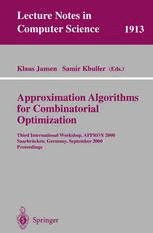
Approximation Algorithms for Combinatorial Optimization: Third International Workshop, APPROX 2000 Saarbrücken, Germany, September 5–8, 2000 Proceedings PDF
Preview Approximation Algorithms for Combinatorial Optimization: Third International Workshop, APPROX 2000 Saarbrücken, Germany, September 5–8, 2000 Proceedings
Lecture Notes in Computer Science 1913 Editedby G.Goos,J. Hartmanisand J.van Leeuwen 3 Berlin Heidelberg NewYork Barcelona HongKong London Milan Paris Singapore Tokyo Klaus Jansen Samir Khuller (Eds.) Approximation Algorithms for Combinatorial Optimization Third International Workshop, APPROX 2000 Saarbru¨cken, Germany, September 5-8, 2000 Proceedings 1 3 SeriesEditors GerhardGoos,KarlsruheUniversity,Germany JurisHartmanis,CornellUniversity,NY,USA JanvanLeeuwen,UtrechtUniversity,TheNetherlands VolumeEditors KlausJansen Christian-Albrechts-Universita¨tzuKiel Institutfu¨rInformatikundpraktischeMathematik Olshausenstr.40,24098Kiel,Germany E-mail:[email protected] SamirKhuller UniversityofMaryland ComputerScienceDepartment,A.V.WilliamsBldg CollegePark,MD20742,USA E-mail:[email protected] Cataloging-in-Publicationdataappliedfor DieDeutscheBibliothek-CIP-Einheitsaufnahme Approximationalgorithmsforcombinatorialoptimization:third internationalworkshop;proceedings/APPROX2000,Saarbru¨cken, Germany,September5-8,2000.KlausJansen;SamirKhuller(ed.).- Berlin;Heidelberg;NewYork;Barcelona;HongKong;London; Milan;Paris;Singapore;Tokyo:Springer,2000 (Lecturenotesincomputerscience;Vol.1913) ISBN3-540-67996-0 CRSubjectClassification(1998):F.2,G.1.2,G.1.6,G.2,G.3,E.1,I.3.5 ISSN0302-9743 ISBN3-540-67996-0Springer-VerlagBerlinHeidelbergNewYork Thisworkissubjecttocopyright.Allrightsarereserved,whetherthewholeorpartofthematerialis concerned,specificallytherightsoftranslation,reprinting,re-useofillustrations,recitation,broadcasting, reproductiononmicrofilmsorinanyotherway,andstorageindatabanks.Duplicationofthispublication orpartsthereofispermittedonlyundertheprovisionsoftheGermanCopyrightLawofSeptember9,1965, initscurrentversion,andpermissionforusemustalwaysbeobtainedfromSpringer-Verlag.Violationsare liableforprosecutionundertheGermanCopyrightLaw. Springer-VerlagBerlinHeidelbergNewYork amemberofBertelsmannSpringerScience+BusinessMediaGmbH (cid:2)c Springer-VerlagBerlinHeidelberg2000 PrintedinGermany Typesetting:Camera-readybyauthor Printedonacid-freepaper SPIN10722743 06/3142 543210 Foreword The Workshop on Approximation Algorithms for Combinatorial Optimization Problems APPROX’2000 focuses on algorithmic and complexity aspects aris- ing in the development of efficient approximate solutions to computationally difficult problems. It aims, in particular, at fostering cooperation among al- gorithmic and complexity researchers in the field. The workshop, to be held at the Max-Planck-Institute for Computer Science in Saarbru¨cken, Wermany, co-locates with ESA’2020 and WWE’2000. We would like to thank the local organizers at the Max-Planck-Institute (AG 8, Kurt Mehlhorn), for this oppor- tunity.APPVOXisanannualmeeting,withpreviousworkshopsinAalborgand Berkeley. Previous proceedings appeared as LNCS 1464 and 1671. Topics of interest for APPROX’2000 are: design and analysis of approxi- mation algorithms, inapproximability results, on-line problems, randomization techniques, average-case analysis, approximation classes, scheduling problems, routingandflowproblems,coloringandiartitioning,cutsandconnectivity,pack- ing andcovering,geometricproblems,networkdesign,and variousapplications. ThenumberofsubmittedpaperstoAPPROX’2000was68fromwhich23paters were selected. This volume contains the selected papers plus papers by invited speakers.All paperspublished inthe workshopproceedingsnere selectedby the program committee on the basis of referee reports. Each paper was reviewed vy at least three referees who judged the papers for originality, quality, and consistency with the topics of the conference. We wouldlike to thank allauthorswho respondedto the callfor papers and ourinvitedspeakers:SanjeevArora(Princeton),DoritS.Hochbaum(Berkeley), Rolf H. Mo¨hring (Berlin), and David B. Shmoys (Cornell). Furthermore, we thank the members of the program committee: – Klaus Jansen (University of Kiel), – Tao Jiang (University of California, Riverside), – Sanjeev Khanna (University of Pennsylvania), – Samir Khuller (University of Maryland), – Jon Kleinberg (Cornell University), – Stefano Leonardi (Universita di Roma), – Rajeev Motwani (Stanford University), – Baruch Schieber (IBM Research), – Martin Skutella (Technical University Berlin), – Eva Tardos (Cornell University / UC Berkeley), – Gerhard Woeginger (Technical University Graz), and – Neal Young (Dartmouth College) andthereviewersF.Afrati(Athens),S.Albers(Dortmund),E.M.Arkin(Stony Brook),E.Bampis(Evry),L.Becchetti(RomeLaSapienza),E.Cela(Graz),C. VI Foreword Chekuri (Bell Labs), J. Cheriyan (Ontario), A. Clementi (Rome Tor Vergata), B. DasGupta (Camden), T. Erlebach (Zu¨rich), W. Fernandez de la Vega (Or- say), A. V. Fishkin (Kiel), P.G. Franciosa (Rome La Sapienza), G. Galambos (Szeged), S. Guha (Stanford University), R. Hassin (Tel-Aviv), C. Kenyon (Or- say),B.Klinz(Graz),J.vandeKlundert(Maastricht),A.Marchetti-Spaccamela (Rome La Sapienza), J. Mitchell (Stony Brook), Y. Milis (Athens), D. Mount (Maryland), K. Munagala (Stanford University), S. Naor (Bell Labs and Tech- nion), J. Noga (Riverside), L. Porkolab(London), B. Raghavachari(Dallas), O. Regev (Tel-Aviv), T. Roughgarden (Cornell), E. Seidel (Kiel), A. Schulz (MIT, Sloan), R. Solis-Oba (London), F. Spieksma (Maastricht), A. Srivastav (Kiel), M.Sviridenko(Aarhus),M.Uetz (TUBerlin),A.Vetta (MIT,Cambridge),and A. Zhu (Stanford University). We gratefully acknowledge sponsorship from the Max-Planck-Institute for Computer Science Saarbru¨cken (AG 1, Kurt Mehlhorn), the EU working group APPOLApproximation andOn-lineAlgorithms,theDFGGraduiertenkollegEf- fizienteAlgorithmenandMehrskalenmethodenandtheTechnicalFacultyandIn- stituteofComputerScienceandAppliedMathematicsoftheChristian-Albrechts- Universita¨t zu Kiel. We also thank Aleksei V. Fishkin, Eike Seidel, and Brigitte Preuss of the research group Theorey of Parallelism, and Alfred Hofmann and Anna Kramer of Springer - Verlag for supporting our project. July 2000 Klaus Jansen, Workshop Chair Samir Khuller, APPROX’2000 ProgramChair Contents Invited Talks Approximation algorithms that take advice 1 Sanjeev Arora Instant recognition of polynomial time solvability, half 2 integrality and 2-approximations Dorit S. Hochbaum Scheduling under uncertainty: Optimizing against a 15 randomizing adversary Rolf H. Mo¨hring Approximation algorithms for facility location problems 27 David B. Shmoys Contributed Talks An approximationalgorithm for MAX DICUT with given 34 sizes of parts Alexander Ageev, Refael Hassin and Maxim Sviridenko Maximizing job benefits on-line 42 Baruch Awerbuch, Yossi Azar and Oded Regev Variable length sequencing with two lengths 51 Piotr Berman and Junichiro Fukuyama Randomized path coloring on binary trees 60 Vincenzo Auletta, Ioannis Caragiannis, Christos Kaklamanis and Pino Persiano Wavelenght rerouting in optical networks, or the Venetian 72 routing problem Alberto Caprara, Giuseppe F. Italiano, G. Mohan, Alessandro Panconesi and Aravind Srinivasan Greedy approximationalgorithms for finding dense 84 components in a graph Moses Charikar Online real-time preemptive scheduling of jobs with 96 deadlines Bhaskar DasGupta and Michael A. Palis VIII Contents On the relative complexity of approximate counting problems 108 Martin Dyer, Leslie Ann Golberg, Catherine Greenhill and Mark Jerrum On the hardness of approximating NP witnesses 120 Uriel Feige, Michael Langberg and Kobbi Nissim Maximum dispersion and geometric maximum weight cliques 132 S´andor P. Fekete and Henk Meijer New results for online page replication 144 Rudolf Fleischer and Steve Seiden Inapproximability results for set splitting and satisfiability 155 problems with no mixed clauses Venkatesan Guruswami Approximation algorithms for a capacitated network design 167 problem R. Hassin, R. Ravi and F.S. Salman An approximationalgorithm for the fault tolerant metric facility 177 location problem Kamal Jain and Vijay V. Vazirani Improved approximations for tour and tree covers 184 Jochen Ko¨nemann, Goran Konjevod, Ojas Parekh and Amitabh Sinha Approximating node connectivity problems via set covers 194 Guy Kortsarz and Zeev Nutov Rectangle tiling 206 Krzysztof Lory´s and Katarzyna Paluch Primal-dual approaches to the Steiner problem 214 Tobias Polzin and Siavash Vahdati Daneshmand On the inapproximability of broadcasting time 226 Christian Schindelhauer Contents IX Polynomialtime approximation schemes for class-constrained 238 packing problem Hadas Shachnai and Tami Tamir Partialservicing of on-line jobs 250 Rob van Stee and Han La Poutr´e Factor 4/3 approximations for minimum 2-connected subgraphs 262 Santosh Vempala and Adrian Vetta Author Index 275
